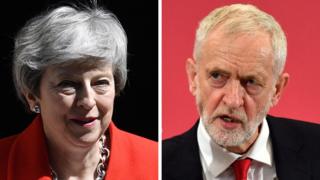Brexit: Jeremy Corbyn says cross-party talks have ‘gone as far as they can’
 Image copyright EPA/Getty Images
Image copyright EPA/Getty Images Jeremy Corbyn says talks with the government to find a compromise over Brexit “have gone as far as they can”.
In a letter to the PM, the Labour leader said the six weeks of cross-party discussions could not carry on due to “the increasing weakness and instability” of the government.
Downing Street has yet to respond.
Labour and the Conservatives are now expected to discuss how to put a number of options to MPs to break the Brexit deadlock in Parliament.
On Thursday the PM promised to set a timetable for leaving Downing Street following a Brexit vote next month.
Environment Secretary Michael Gove said MPs needed to “focus on making sure that we honour [the] mandate” of leaving the EU.
Theresa May will try once again to win the support of MPs in the week beginning 3 June, when the Commons votes for the first time on the EU Withdrawal Agreement Bill – the legislation needed to implement her deal with the EU.
Brexit had been due to take place on 29 March – but after MPs voted down the deal Mrs May had negotiated with the bloc three times, the EU gave the UK an extension until 31 October.
This prompted negotiations between the Tories and Labour to see if the parties could come to a Brexit agreement.
But, in a letter to the prime minister, Mr Corbyn said the move towards choosing a new leader for the Conservative Party meant “the position of the government has become ever more unstable and its authority eroded”, undermining confidence in the “government’s ability to deliver any compromise agreement”.
He also said that “not infrequently, proposals by your negotiating team have been publicly contradicted by statements from other members of the cabinet”.
Mr Corbyn described the talks as “detailed” and “constructive”, but said “while there are some areas where compromise has been possible, we have been unable to bridge important policy gaps between us”.
He said the party would “carefully consider” any proposals the government, but that, without “significant changes”, Labour would continue to oppose the “botched deal”.
Labour’s favoured plan includes a permanent customs union with the EU, meaning no internal tariffs (taxes) on goods sold between the UK and the rest of the bloc.
It also keeps the option of a further referendum on the table, giving the public a say on the deal agreed by Parliament.
Both scenarios have caused anger among Brexit-backing Conservatives, who claim a customs union would stop the UK negotiating its own trade deals around the world and who believe another public vote is undemocratic.
Some MPs have also criticised Mrs May for even entering into talks with Labour, but the prime minister said the government had “no choice but to reach out across the House of Commons”.
Tory backbencher Simon Clarke responded to the news on Twitter, saying: “Thank God. They [the talks] ought never to have happened.”
And fellow Tory MP Priti Patel, who is a Leave supporter, also said many members of the party “did question the judgement of the cabinet when they approved [the] talks”.
BBC political editor Laura Kuenssberg said if the bill were defeated next month, Mrs May would be expected to announce that she was stepping down.
On Thursday, former Foreign Secretary Boris Johnson became the latest MP to put his name forward as a possible successor.
Asked by reporters if he would be running for the leadership, Mr Gove said it was now time for colleagues to concentrate on delivering Brexit.
“All parliamentarians now must focus on making sure that we honour that mandate, we deliver on the referendum and leave the European Union,” he said.








